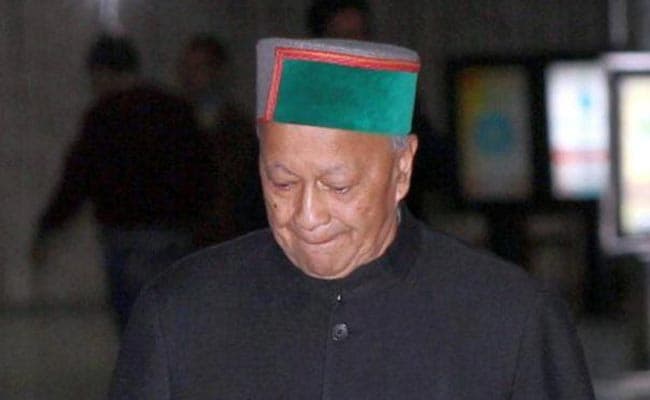
The much-awaited trial against former Himachal Pradesh chief minister Virbhadra Singh will commence on April 3 as the veteran Congress leader on Friday claimed innocence before a Delhi court and decided to contest the disproportionate assets case of over Rs 10 crore lodged by CBI.
Special CBI Judge Arun Bhardwaj fixed three dates -- April 3, 4 and 5 -- when the CBI will start recording statements of the witnesses in the case.
"Today, the case is listed for recording plea of the accused no 1, Virbhadra Singh and accused no 3 Anand Chauhan to the charge framed against them pursuant to order passed on December 10, 2018," the court said.
Charges have been read over and explained to the accused to which they pleaded not guilty and claimed trial, it said.
During the hearing, Singh and his wife, who were present in the court, moved a plea seeking permanent exemption from appearing in the court during the trial of the case.
The court asked CBI to file its reply on their plea before the next date of hearing.
In a separate case filed by the Enforcement Directorate, the agency filed third supplementary charge sheet against Singh in a money laundering case.
The court said it would take up the matter on March 18.
ED's supplementary charge sheet was filed through advocates Nitesh Rana and N K Matta.
The court had on December 10 last year ordered framing of charges against Mr Singh for alleged criminal misconduct and amassing disproportionate assets of over Rs 10 crore, saying he intended to cause loss to the tax authorities by presenting unaccounted money as sale proceeds of apples.
Apart from the two offences under the Prevention of Corruption (PC) Act, the court had said that prima facie charges of alleged forgery and attempt to cheat under the IPC were also made out against the 82-year-old Congress leader and former Union minister.
The court had also ordered framing of charges against his wife, Pratibha Singh, and seven others for allegedly abetting in the offences.
After formal framing of charges, the court commences trial in the case.
The other seven accused are LIC agent Anand Chauhan, Chunni Lal Chauhan, Joginder Singh Ghalta, Prem Raj, Vakamulla Chandrasekhar, Lawan Kumar Roach and Ram Prakash Bhatia.
The court in its 105 page order said that Virbhadra Singh and Anand Chauhan "fraudulently and dishonestly" signed a memorandum of understanding (MoU) by ante-dating it to give an impression that it was signed on June 15, 2008 by them.
"They knew that MoU was not made, signed or executed by them on June 15, 2008. They prepared and signed this MoU with the intention of causing it to be believed that this MoU was made by them on June 15, 2008.
"The investigation of CBI has shown that this MoU was ante-dated. Therefore, they can be said to have made a false document," the court said.
It had added that since the document was made for showing unaccounted money as sale proceeds of apples, they were liable to be charged for the offence of forgery.
Reluctantly, Virbhadra Singh is liable to be charged under section 13 (2) (misconduct) read with Section 13 (1) (e)(amassing disproportionate assets) of PC Act.
"Since an attempt was also made to cheat the Income Tax authorities using a false document i.e. ante-dated MoU to procure favourable Income Tax assessment order, Virbhadra Singh is also liable to be charged under section 511 (attempt) of IPC read with section 420 (cheating) of IPC," the court had said.
The punishment for the offences of criminal misconduct and disproportionate assets under the PC Act range between one to seven years jail term, forgery under IPC entails a maximum of two years imprisonment and the offence of cheating could lead to a maximum sentence of seven years.
On the role of his wife, the court had said there was "grave suspicion" that she committed the offence of abetment under the IPC.
Advocate Tarannum Cheema, representing Virbhadra Singh, had argued that no prior consent of the Himachal Pradesh government was taken for carrying out investigation in the state.
Dealing with the argument, the court had said that the Delhi High Court in October this year had held that for registration of case in a state other than in a Union Territory, the consent of that state government was required.
"No consent is required for investigation in another State, if the case is registered in Delhi," the special court said referring to the high court decision.
CBI had registered the case against Singh and others for allegedly amassing assets worth around Rs 10 crore disproportionate to their known source of income when he was the Union Minister in the UPA government.
A chargesheet running into over 500 pages, filed in the court, claims that Singh had amassed assets worth around Rs 10 crore which were disproportionate by 192 per cent of his total income during his tenure as a Union Minister.
The final report, filed against nine people for alleged offences punishable under section 109 (abetment) and 465 (punishment for forgery) of IPC and Prevention of Corruption Act, arrayed around 225 witnesses and 442 documents.
The matter was transferred by the Supreme Court from the Himachal Pradesh High Court to the Delhi High Court, which on April 6, 2016 had asked the CBI not to arrest Singh and had directed him to join the probe.
Track Latest News Live on NDTV.com and get news updates from India and around the world

